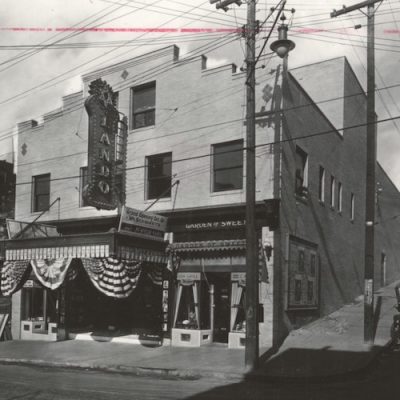
The Lando Theater was a Yiddish playhouse, movie theater and meeting hall at 1851 Centre Avenue in the Hill District neighborhood of Pittsburgh. While many theaters throughout Pittsburgh regularly hosted Yiddish productions in the early 20th century, the Lando was one of a small number of American theaters outside New York City dedicated exclusively to Yiddish productions.
William Lando was a real-estate developer who came to Pittsburgh from his native Romania in the early 20th century. In the late 1920s, he purchased a plot of land at the corner of Center Avenue and Green Street from the former Zionist Institute on the condition he build a Jewish community theater at the site.[1]“New Yiddish Theater Planned for This City,” Jewish Criterion, April 20, 1928, p 16 (online). The 1,000-seat Lando Theater opened on October 8, 1928 with a production of “His Jewish Girl” starring William Schwartz.[2]“Pittsburgh Jewry Welcomes Lando’s Yiddish Theater,” Jewish Criterion, October 5, 1928, p 12-13 (online).
The Lando Theater typically hired Yiddish troops from New York City, often working through the Hebrew Actors Union before the start of each season. The theater temporarily closed in late 1929 over a labor dispute with actors from the union.[3]“Strife Closes Hill Theater,” Pittsburgh Post-Gazette, Nov. 23, 1929, Sec. 2, p 1 (online—Newspapers.com). [4]“A Letter to Pittsburgh Theater Goers…” Jewish Criterion, Nov. 29, 1929, p 28 (online). In addition to plays, the Lando occasionally showed Yiddish film and hosted concerts. It also served as a community space. It hosted benefits for Jewish organizations and causes, provided meeting space for local Jewish community groups, and brought speakers to the city.
The Lando Theatre used the name Lando’s Grand Theatre, or simply the Grand Theatre, as early as 1932, and switched to Lando’s Central Theatre as early as 1940. The name changes may have been an attempt to encourage greater attendance by theatergoers outside the Hill District. Despite smaller than expected audiences, prompted in part by the migration of the local Jewish population away from the Hill District in the 1930s, the Lando Theater remained in operation through the end of the 1941-1942 season.[5]“Jennie Goldstein at Lando’s Central Theatre,” Jewish Criterion, April 20, 1942, p 24 (online).
The Lando Realty Company was renting the building to other tenants as early as February 1944,[6]Lando Realty Co. advertisement, Jewish Criterion, February 4, 1944, p 24 (online). and William Lando was producing Yiddish plays at other theaters in the city later that year.[7]“Sadie Sheingold Coming to Y.M.H.A.,” Jewish Criterion, Nov. 17, 1944, p 13 (online). The building at 1851 Centre Avenue was used as a Salvation Army store in the 1960s and demolished sometime after 1969.[8]“Salvation Army Stores Plan Sale,” Pittsburgh Press, May 13, 1964, p2 (online—Newspapers.com). [9]1851 Center Avenue demolition, request for bids, Pittsburgh Post-Gazette, Oct. 22, 1969, p 17 (online—Newspapers.com).
References
| ↑1 | “New Yiddish Theater Planned for This City,” Jewish Criterion, April 20, 1928, p 16 (online). |
|---|---|
| ↑2 | “Pittsburgh Jewry Welcomes Lando’s Yiddish Theater,” Jewish Criterion, October 5, 1928, p 12-13 (online). |
| ↑3 | “Strife Closes Hill Theater,” Pittsburgh Post-Gazette, Nov. 23, 1929, Sec. 2, p 1 (online—Newspapers.com). |
| ↑4 | “A Letter to Pittsburgh Theater Goers…” Jewish Criterion, Nov. 29, 1929, p 28 (online). |
| ↑5 | “Jennie Goldstein at Lando’s Central Theatre,” Jewish Criterion, April 20, 1942, p 24 (online). |
| ↑6 | Lando Realty Co. advertisement, Jewish Criterion, February 4, 1944, p 24 (online). |
| ↑7 | “Sadie Sheingold Coming to Y.M.H.A.,” Jewish Criterion, Nov. 17, 1944, p 13 (online). |
| ↑8 | “Salvation Army Stores Plan Sale,” Pittsburgh Press, May 13, 1964, p2 (online—Newspapers.com). |
| ↑9 | 1851 Center Avenue demolition, request for bids, Pittsburgh Post-Gazette, Oct. 22, 1969, p 17 (online—Newspapers.com). |